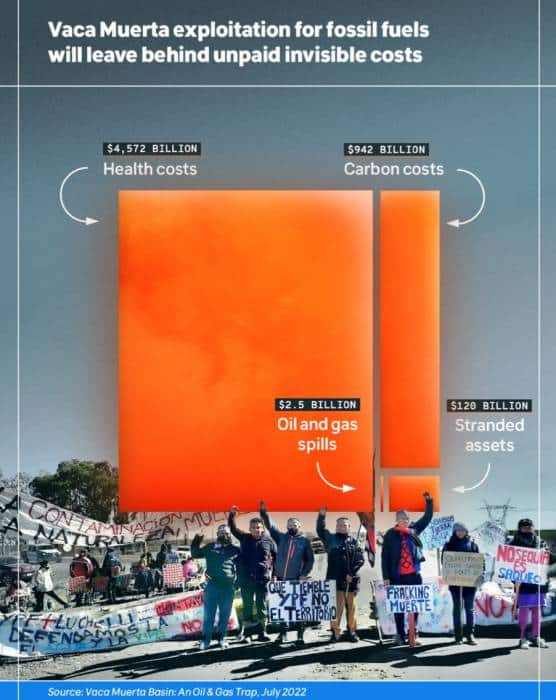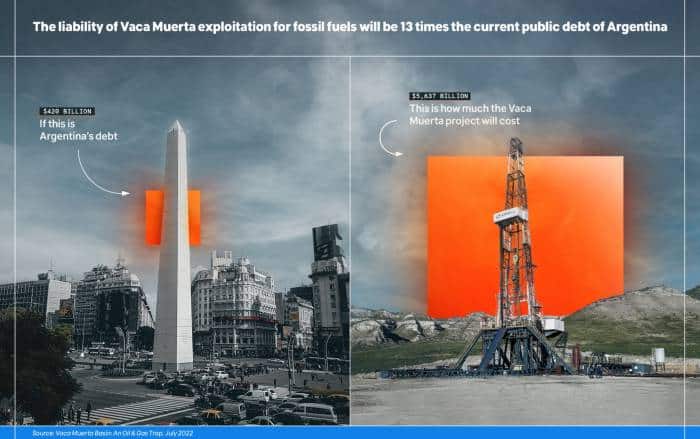The hidden costs of fracking in Vaca Muerta, Argentina could reach more than US$5.6 trillion
Note to the editors: download here the infographics, the media kit and the report.
Sold to Argentinian society as the solution to energy dependence and the stranglehold of foreign debt, the exploitation of the Vaca Muerta oil and gas reserves is at risk of worsening the country’s economic and fiscal crisis. The report “Vaca Muerta: an oil and gas trap”, released on October 13th, was commissioned by 350.org and researched by Dutch consultancy agency Profundo.
The study shows that the sum of all the hidden costs of Vaca Muerta to the global society could exceed US$5.6 trillion, which represents 13 times Argentina’s current public debt.

Hidden costs include:
- The public health impacts of burning fossil fuels extracted in Vaca Muerta,
- The damage caused by potential oil and gas leaks
- A possible tax on the carbon emitted
- The assets that would end up stranded in a global energy transition scenario.
“In addition to being a carbon bomb that exacerbates the global climate crisis, Vaca Muerta also represents a bomb for the Argentinian economy. What fossil fuel companies around the world do is to concentrate profits in the hands of a few and share the enormous financial, social and environmental costs of their operations with everyone, this is especially visible in the case of Vaca Muerta,”, said Victoria Emanuelli, a campaigner for 350.org in Latin America.
The collective economic impacts of Vaca Muerta add to the local social and environmental damage that has already affected thousands of families in the Argentinian provinces of Neuquén and Río Negro. Indigenous communities of the Mapuche people are dealing with the loss of biodiversity and the risks of contamination of water sources. Small farmers face difficulties in the consumer market for fear of food contamination by fracking. Many families in areas near the fracking wells suffer from cracks in their houses and the fear of earthquakes, which have become more frequent and intense after the start of operations of the fossil fuel companies.
To support communities on the front lines of resistance to Vaca Muerta, 350.org will also soon release a documentary on the consequences of fracking in Argentine Patagonia.
Demand for solutions to the public debt

Another contribution from the report to public debate is the analysis of the role of the World Bank (WB) and the International Monetary Fund (IMF) in the expansion of Vaca Muerta. The authors of the study point out that the two financial organizations reinforce, through their policies and their discourse on the Argentine economy, the false narrative that the exploitation of fossil fuels would be necessary to overcome the economic crisis.
To demand a realignment of these institutions to the Argentinian reality, the 350.org study is made public during the Global Week of Justice and Mobilization for Debt Cancellation and at the same time that the WB and the IMF hold annual meetings to discuss their policies.
This year, hundreds of social and environmental organizations from around the world, including 350.org, are asking financial institutions and governments for measures to alleviate the burden of the public debt on developing countries.
“The report about Vaca Muerta reinforces the demand of the progressive movements for new solutions for the debts of the countries of the Global South, by showing a clear example of how the lobby of irresponsible economic sectors and neocolonialism aggravate the debt of an entire country, with the complicity of financial organizations,” said Ilan Zugman, director of 350.org in Latin America.
Learn more about the hidden costs of Vaca Muerta.
Media contact
Peri Dias
350.org Communications in Latin America
[email protected] / +351 913 201 040